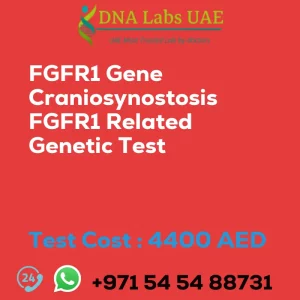ERCC6 Gene Cockayne Syndrome Type B Genetic Test
At DNA Labs UAE, we offer the ERCC6 Gene Cockayne Syndrome Type B Genetic Test. This test aims to identify mutations in the ERCC6 gene, which is responsible for producing the DNA excision repair protein ERCC-6. Mutations in this gene can lead to Cockayne Syndrome Type B, a rare genetic disorder.
Test Details
The ERCC6 gene is involved in repairing damaged DNA. Mutations in this gene can cause Cockayne Syndrome Type B, which is characterized by symptoms such as growth failure, intellectual disability, sensitivity to sunlight, hearing loss, and premature aging. Individuals with this condition typically have a shorter lifespan compared to the general population.
Our ERCC6 Gene Cockayne Syndrome Type B Genetic Test utilizes Next-Generation Sequencing (NGS) technology. This method allows us to analyze multiple genes simultaneously, including the ERCC6 gene. By obtaining a DNA sample, usually through a blood or saliva sample, we can analyze the DNA sequence of the ERCC6 gene and identify any mutations present.
Test Components and Price
The ERCC6 Gene Cockayne Syndrome Type B Genetic Test is priced at 4400.0 AED. The test can be conducted using a blood sample, extracted DNA, or one drop of blood on an FTA card.
Report Delivery
After conducting the test, the report will be delivered within 3 to 4 weeks.
Test Type and Doctor
The ERCC6 Gene Cockayne Syndrome Type B Genetic Test falls under the Dysmorphology test type and is performed by our experienced team of pediatricians in the Genetics department.
Pre Test Information
Prior to undergoing the ERCC6 Gene Cockayne Syndrome Type B NGS Genetic DNA Test, it is important to provide the clinical history of the patient. Additionally, a genetic counseling session may be conducted to draw a pedigree chart of family members affected by ERCC6 Gene Cockayne Syndrome Type B.
Conclusion
NGS genetic testing for the ERCC6 gene can help confirm a diagnosis of Cockayne Syndrome Type B and provide information about the specific genetic mutation present in an individual. This information is crucial for guiding treatment and management strategies. It is recommended to consult with a healthcare professional or genetic counselor to understand the benefits, limitations, and potential risks of genetic testing before undergoing any procedures.
| Test Name | ERCC6 Gene Cockayne syndrome type B Genetic Test |
|---|---|
| Components | |
| Price | 4400.0 AED |
| Sample Condition | Blood or Extracted DNA or One drop Blood on FTA Card |
| Report Delivery | 3 to 4 Weeks |
| Method | NGS Technology |
| Test type | Dysmorphology |
| Doctor | Pediatrics |
| Test Department: | Genetics |
| Pre Test Information | Clinical History of Patient who is going for ERCC6 Gene Cockayne syndrome type B NGS Genetic DNA Test. A Genetic Counselling session to draw a pedigree chart of family members affected with ERCC6 Gene Cockayne syndrome type B NGS Genetic DNA Test gene ERCC6 |
| Test Details |
The ERCC6 gene is responsible for producing a protein called DNA excision repair protein ERCC-6, which is involved in repairing damaged DNA. Mutations in the ERCC6 gene can lead to a rare genetic disorder known as Cockayne syndrome type B. Cockayne syndrome type B is characterized by a variety of symptoms including growth failure, intellectual disability, sensitivity to sunlight, hearing loss, and premature aging. Individuals with this condition often have a shorter lifespan compared to the general population. NGS (Next-Generation Sequencing) genetic testing is a method used to analyze multiple genes simultaneously. In the context of Cockayne syndrome type B, NGS genetic testing can be used to identify mutations in the ERCC6 gene. This can help confirm a diagnosis and provide information about the specific genetic mutation present in an individual. NGS genetic testing involves obtaining a DNA sample, usually through a blood or saliva sample, and analyzing the DNA sequence of the ERCC6 gene. The results of the test can help guide treatment and management strategies for individuals with Cockayne syndrome type B. It is important to consult with a healthcare professional or genetic counselor to discuss the benefits, limitations, and potential risks of genetic testing before undergoing any testing procedure. |








